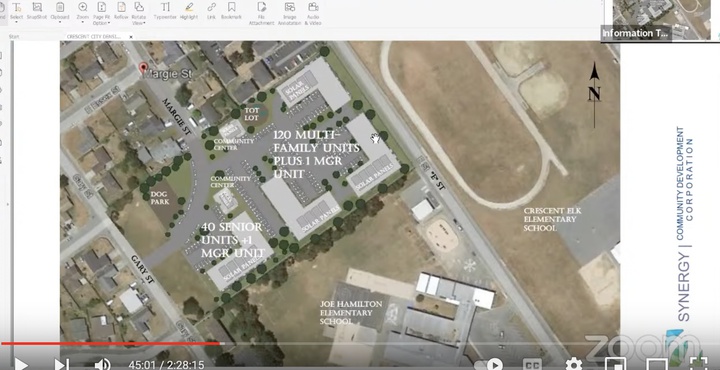Jessica Cejnar Andrews / Tuesday, Aug. 16, 2022 @ 3:35 p.m. / Homelessness, Infrastructure, Local Government
Crescent City Council Offers Blessing to New Apartment Development, Housing Authority's Efforts to Build Housing Stock

Concept art for a proposed apartment complex near Joe Hamilton Elementary School that would offer housing for low-income families, seniors and workforce housing. | Image courtesy of Crescent City
Previously:
• Crescent City Council Considers Low-Income, Senior Housing Development Near Joe Hamilton Elementary
###
Councilors gave their blessing to a Crescent City Housing Authority effort to increase housing opportunities for its clients as well as a proposed apartment complex staff say could fit in with that effort.
Acting as the Housing Authority’s Board of Directors on Monday, the Crescent City Council unanimously authorized the Authority to issue a request for proposals that would make up to 70 project-based vouchers available to potential developers.
After adjourning from the Housing Authority, Councilors also agreed to provide a letter of support for Battery Point Apartments, a proposed 160-unit development near Joe Hamilton Elementary School that includes workforce, low-income family and senior housing.
The developers, Synergy Community Development Corporation and Step Forward Communities, plan to use that letter in its efforts to get an Infill and Infrastructure Grant from the state Department of Housing and Community Development.
“If we’re successful in getting that financing it works kind of like a magnet,” said Synergy Development Corporation CEO, Bill Rice. “We’re applying to Housing and Community Development for their infrastructure grant program. We believe that will make us very competitive in early next year to apply for federal tax credits.”
Tax credits is a primary option for low-income housing developers in Crescent City, City Manager Eric Wier told Councilors.
If they’re interested, Synergy and Step Forward Communities could take advantage of the Housing Authority’s project-based voucher program once Battery Point Apartments is built, Director Megan Miller told the Wild Rivers Outpost.
Another Synergy-owned apartment complex in Crescent City, Valhalla Pacific Townhomes, is in the process of being able to offer 25 project-based vouchers to residents in need of housing, Miller said.
Approved by the Housing Authority board in May, Valhalla’s project-based voucher program still has to go through environmental review before it’s finalized, she said.
On Monday, Miller told Councilors that she hoped offering up to 70 project-based housing vouchers would draw large-scale development to Crescent City. This would not only maximize the number of units offered to the Housing Authority’s clients, it be a benefit to renters throughout the community.
“When you get into large-scale developments, it increases the likelihood for mixed use,” she told Councilors. “That would mean there would be units developed for families in the community that are not served under our program.”
The Crescent City Housing Authority usually receives about 30 to 35 requests for assistance each month, Miller said. Those that fall into the lowest income bracket, typically wait 30-60 days before being issued a voucher. The participant then finds a landlord willing to work with the Housing Authority and their rent is subsidized, Miller said.
However, since the pandemic, the number of landlords willing to offer units through the Housing Authority’s voucher program has decreased, Miller said. Before the pandemic, the Housing Authority’s voucher success rate was about 50 percent. Since then, the Authority’s voucher success rate is down by about 40 percent, Miller told the Outpost.
Miller said she thinks the pandemic spurred that decrease in the number of landlords willing to offer subsidized housing.
“People stopped moving initially, and we normally had a revolving door of people who would move every month. When people would vacate units, the families with newly issued vouchers would backfill those units and all that stopped during the pandemic,” she told the Outpost, adding that home values have increased so many landlords were selling investment properties or those properties became owner-occupied units.
“In the meantime, demand for rentals has gone way up so the cost of rentals has gone way up, and in our program, there are limitations to how much the families can pay for rent.”
Being able to offer up to 70 project-based vouchers won’t affect anyone that’s currently waiting to find a place to live, Miller told Councilors, but would increase their opportunities.
The Housing Authority would notify its clients that there’s another waiting list they can take advantage of for a project-based voucher at a particular location, she said.
Those who already receive housing vouchers can also apply to take part in the project-based housing voucher program, Miller said.
“Our biggest problem is we’re issuing all these vouchers and we’re just seeing them go unused,” she said. “It’s defeating, especially for the families we’re talking about.”
As for Battery Point Apartments, the proposed housing development is being considered for two parcels of land at Gary and E streets behind Joe Hamilton Elementary School. Once developed 40 units would be offered for senior housing and 120 units would go toward low-income families and workforce housing.
According to Wier, the Infill and Infrastructure Grant would enable Synergy and Step Forward Communities to build the water, sewer, storm drain, and even transit improvements necessary to move the project along.
CLICK TO MANAGE